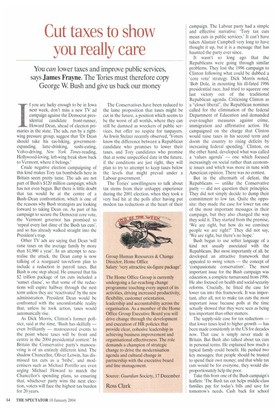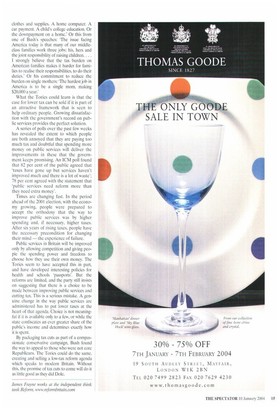Cut taxes to show you really care
You can lower taxes and improve public services, says James Frayne. The Tories must therefore copy George W. Bush and give us back our money
If you are lucky enough to be in Iowa next week, don't miss a new TV ad campaign against the Democrat pres idential candidate front-runner, Howard Dean, ahead of election primaries in the state. The ads, run by a rightwing pressure group, suggest that 'Dr Dean should take his tax-hiking, governmentexpanding, latte-drinking, sushi-eating, Volvo-driving, New York Times-reading, Hollywood-loving, left-wing freak show back to Vermont, where it belongs.'
Crude negative election campaigning of this kind makes Tory tax bombshells here in Britain seem pretty tame. The ads are not part of Bush's $120 million campaign, which has not even begun. But there is little doubt that tax would be at the centre of a Bush–Dean confrontation, which is one of the reasons why Bush strategists are looking forward to taking Dean on. As part of his campaign to secure the Democrat core vote, the Vermont governor has promised to 'repeal every last dime of the Bush tax cuts', and so has already walked straight into the President's trap.
Other TV ads are saying that Dean 'will raise taxes on the average family by more than $1,900 a year'. In an attempt to neutralise the attack, the Dean camp is now talking of a rearguard tax-reform plan to include a reduction in payroll taxes. But Bush is one step ahead. He ensured that his $2 trillion package of tax cuts included a 'sunset clause', so that some of the reductions will expire halfway through the next term unless they are 'reactivated' by the new administration. President Dean would be confronted with the uncomfortable reality that, unless he took action, taxes would automatically rise.
As Dick Morris, Clinton's former pollster, said at the time, 'Bush has skilfully — even brilliantly — manoeuvred events to the point where taxes will be front and centre in the 2004 presidential contest.' In Britain the Conservative party's manoeuvring is of an entirely different kind. The shadow Chancellor. Oliver Letwin, has dismissed tax cuts as a 'bribe', and modernisers such as Michael Portillo are even urging Michael Howard to match the Chancellor's spending plans, so ensuring that, whichever party wins the next election, voters will face the highest tax burden for 20 years. The Conservatives have been reduced to the lame proposition that taxes might be cut in the future, a position which seems to be the worst of all worlds, where they can still be damned as wreckers of public services, but offer no respite for taxpayers. As Irwin Stelzer recently observed, 'Voters know the difference between a Republican candidate who promises to lower their taxes, and Tory candidates who promise that at some unspecified date in the future, if the conditions are just right, they will plan to try to attempt to keep taxes below the levels that might prevail under a Labour government.'
The Tories' unwillingness to talk about tax stems from their unhappy experience during the 2001 election, when they took a very bad hit at the polls after having put modest tax reductions at the heart of their campaign. The Labour party had a simple and effective narrative: 'Tory tax cuts mean cuts in public services.' It can't have taken Alastair Campbell very long to have thought it up, but it is a message that has haunted the party ever since.
It wasn't so long ago that the Republicans were going through similar problems. They lost the 1996 campaign to Clinton following what could be dubbed a 'core vote' strategy. Dick Morris noted, 'Bob Dole, in mounting his ill-fated 1996 presidential race, had tried to squeeze one last victory out of the traditional Republican agenda. Criticising Clinton as a "closet liberal", the Republican nominee called for the elimination of the federal Department of Education and demanded ever-tougher measures against crime, immigration and affirmative action. He campaigned on the charge that Clinton would raise taxes in his second term and doom the country to rising deficits by increasing federal spending.' Clinton, on the other hand, developed what was called a 'values agenda' — one which focused increasingly on social rather than economic issues and which was more in tune with American opinion. There was no contest.
But in the aftermath of defeat, the Republicans — unlike the Conservative party — did not question their principles. They did not simply decide to dump their commitment to low tax. Quite the opposite: they made the case for lower tax one of the most important messages in their campaign, but they also changed the way they sold it. They started from the premise, 'We are right, but how do we convince people we are right?' They did not say, 'We are right, but there's no hope.'
Bush began to use softer language of a kind not usually associated with the Republicans. But most importantly of all, he developed an attractive framework that appealed to swing voters — the concept of 'compassionate conservatism'. The most important issue for the Bush campaign was education, a complete turnaround from 1996. He also focused on health and social-security reforms. Crucially, he fitted the case for lower tax into this framework. It was important, after all, not to make tax cuts the most important issue because polls at the time actually showed that they were seen as being less important than other matters.
The supply-side case for tax reductions — that lower taxes lead to higher growth — has been made consistently in the US for decades now. That case is simply never made in Britain. But Bush also talked about tax cuts in personal terms. He explained how much a typical family could benefit. He pushed two key messages: that people should be trusted to spend their own money; and that while tax cuts would be for everyone, they would disproportionately help the poor.
Take this from one of the Bush campaign's leaflets: The Bush tax cut helps middle-class families pay for today's bills and save for tomorrow's needs. Cash back for school clothes and supplies. A home computer. A car payment. A child's college education. Or the downpayment on a home.' Or this from one of Bush's speeches: 'The issue facing America today is that many of our middleclass families work three jobs: his, hers and the joint responsibility of raising children.. . .
strongly believe that the tax burden on American families makes it harder for families to realise their responsibilities, to do their duties.' Or his commitment to reduce the burden on single mothers: The hardest job in America is to be a single mom, making $20,000 a year,' What the Tories could learn is that the case for lower tax can be sold if it is part of an attractive framework that is seen to help ordinary people. Growing dissatisfaction with the government's record on public services provides the perfect solution.
A series of polls over the past few weeks has revealed the extent to which people are both annoyed that they are paying too much tax and doubtful that spending more money on public services will deliver the improvements in these that the government keeps promising. An ICM poll found that 82 per cent of the public agreed that 'taxes have gone up but services haven't improved much and there is a lot of waste': 78 per cent agreed with the statement that 'public services need reform more than they need extra money'.
Times are changing fast. In the period ahead of the 2001 election, with the economy growing, people were prepared to accept the orthodoxy that the way to improve public services was by higher spending and, if necessary, higher taxes. After six years of rising taxes, people have the necessary precondition for changing their mind — the experience of failure.
Public services in Britain will be improved only by allowing competition and giving people the spending power and freedom to choose how they use their own money. The Tories seem to have accepted this in part, and have developed interesting policies for health and schools 'passports'. But the reforms are limited, and the party still insists on suggesting that there is a choice to be made between improving public services and cutting tax. This is a serious mistake. A genuine change in the way public services are administered has to put lower taxes at the heart of that agenda. Choice is not meaningful if it is available only to a few, or while the state confiscates an ever greater share of the public's income and determines exactly how it is spent.
By packaging tax cuts as part of a compassionate conservative campaign, Bush found the way to appeal to those who were not core Republicans. The Tories could do the same, creating and selling a low-tax reform agenda which speaks to modern Britain. Without this, the promise of tax cuts to come will do it as little good as they did Dole.
James Frayne works at the independent think tank Reform, wwwrefomthritain.com



























































 Previous page
Previous page